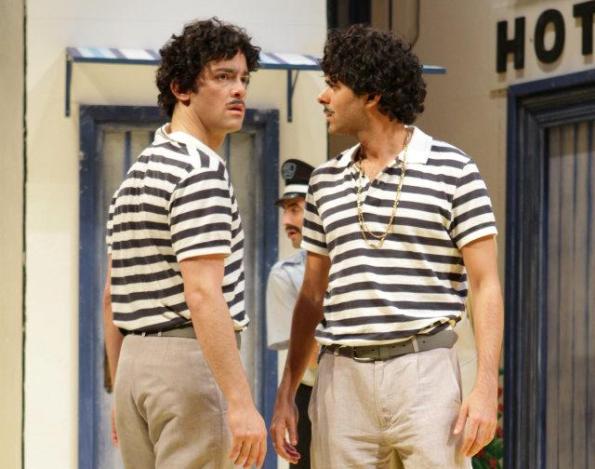
Shakespeare is a hearty beverage to quaff, even at his lightest, as in The Comedy of Errors, currently running at the Cameri Theatre, in a Hebrew version by Dori Parnes, directed by Moshe Kepten. The cup over-full with images, associations, and ideas; one might sip or swim, plunging headlong into that ocean of words.
Kepten helms this voyage with a knowing smile, letting the story of two sets of identical twins separated in infancy become as raucously funny as it was meant to be, while revealing its hidden depths. Parnes carouses through the play with the intoxicating freedom that comes from a lifetime of knowledge and playing in the Shakespearean fields. It’s a ribald, bawdy, fast-paced, bold and utterly contemporary translation, inspiring an almost illicit pleasure in the listener.
Reading the cast list is excellent preparation for the play, as one is likely to emerge as confused as the protagonists of this farcical comedy. Antipholus of Syracuse (Dan Shapira) and his servant Dromio of Syracuse (Yaniv Biton), while searching for the twin from whom Antipholus was separated at sea, arrive in Ephesus, which unbeknownst to them is the home of their twins (Iftach Ophir and Ido Mosseri respectively). Seasick, anyone? It sounds a lot more confusing on paper, live onstage the antics of the two pairs of twins as they muddle their way through mix-ups and mishaps is thoroughly entertaining. Mysteriously, they never encounter one another as they gallivant through this small town, and some things just don’t make sense – didn’t Shakespeare find it a bit much to give these boys identical names? Yet one willingly accepts the nonsense, in the spirit of the all-out, crazy fun of this production. Emblematic is a scene between the Syracuse Antipholus and Dromio extolling the ample attributes of Luce (Aya Granit-Shva), servant to Adrianna, wife of the Ephesus Antipholus. It’s a comic sketch that can and does stand alone, audaciously crude, witty and hilarious. The anything-goes feeling is enhanced by the music, which connects the Shakespearean text to the here and now in the most visceral way. The more conservative Shakespeare devotee might be tempted to ask “What the fuck?” – but this writer says: Viva la fiesta!
The far more serious risk taken here is in adding the role of a narrator to the play, with Dori Parnes creating a textual collage of quotes from other Shakespeare plays interspersed with contemporary material. Yet far from violating the integrity, the narrator, brilliantly played by Oded Teomi (who also plays Egeon, the father of the twins), enhances the comedy and is a gentle guide to the more serious currents inherent in the play. The addition of the narrator introduces a distance between the play and the audience, a distance from the immediacy of laughter.
Kepten sets the tone even before the play begins. Entering the theatre hall, there is no curtain and the set is in plain view: a Mediterranean street scene, the stage dark but for the incongruous dresser with make-up mirror in the center. As people walk into the hall and take their seats, an actor (Teomi) walks on to the set, sits at the table, and begins to apply his make-up. When the lights come on, he begins to speak as the narrator, creating a self-referential prologue to the play that invites one to consider the relationships between the actor and his character, author/director and play, and the broader questions of appearance and identity. These questions are not only characteristic of Shakespeare’s work in general, but inherent in The Comedy of Errors.
This “comedy” opens with a situation that is far from comic: the merchant Egeon of Syracuse is about to be sentenced to death for the crime of landing in Ephesus, the crime of being a stranger. Egeon appeals to the Duke of Ephesus (wonderfully portrayed by Eli Gornstein), recounting the sad tale of his twin sons and the ensuing search for the one lost at sea (which provides an apt exposition of the background story). Although the Duke is moved by his plight, the only way to evade the sentence is to pay an exorbitant fine. The grim scene soon gives way to the tale of the twins and their comic misadventures. Antipholus of Syracuse roams Ephesus safe from arrest, because he looks just like Antipholus of Ephesus, and Egeon re-emerges only in the last scene for the anticipated happy end.
Oded Teomi as narrator provides a contemporary comic commentary on the play that invites the audience to take a step back, to look at the play, the art and artifice of theatre, love, commerce and politics from twin perspectives: comic and serious.
The Comedy of Errors by William Shakespeare
Hebrew version by Dori Parnes
Directed by Moshe Kepten
Set by Ruth Dar
Costumes by Moni Mednik
Music by Shmulik Neufeld
Lighting by Amir Brenner
Language and Speech Assi Eshed
Cast:
Egeon, the father/Narrator – Oded Teomi; Emilia his wife – Gilat Ankori; Antipholus of Syracuse – Dan Shapira; Antipholus of Ephesus, his twin brother – Iftach Ophir; Dromio of Syracuse, a servant – Yaniv Biton; Dromio of Ephesus, his twin brother, a servant – Ido Mosseri; Adrianna, wife to Antipholus of Ephesus – Michal Bernstein/Andreea Schvartz; Luciana, her sister – Tal Blankstein; Luce, servant to Adriana – Aya Granit-Shva; A Courtesan – Rona Lee Shimon; The Duke, Governor of Ephesus – Eli Gornstein; A goldsmith – Nadav Assulin; Balthazar – Avi Termin; Merchant A/Doctor Pinch – Ziv Kleier; Merchant B – Lior Zohar; Officer – Eran Mor; Messenger – Daniel Selitzer; Innkeeper – Tsafrir Elbaz.





